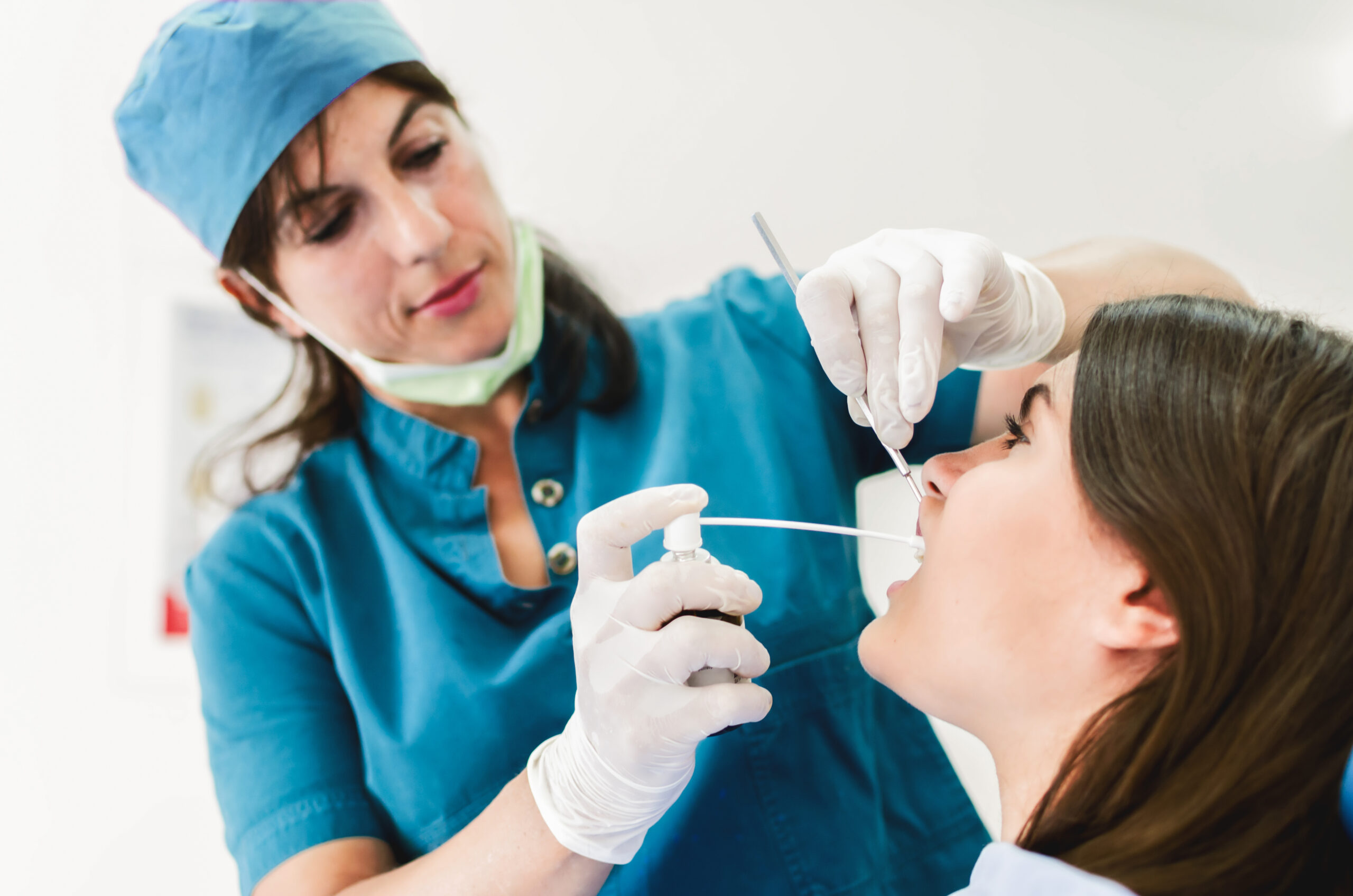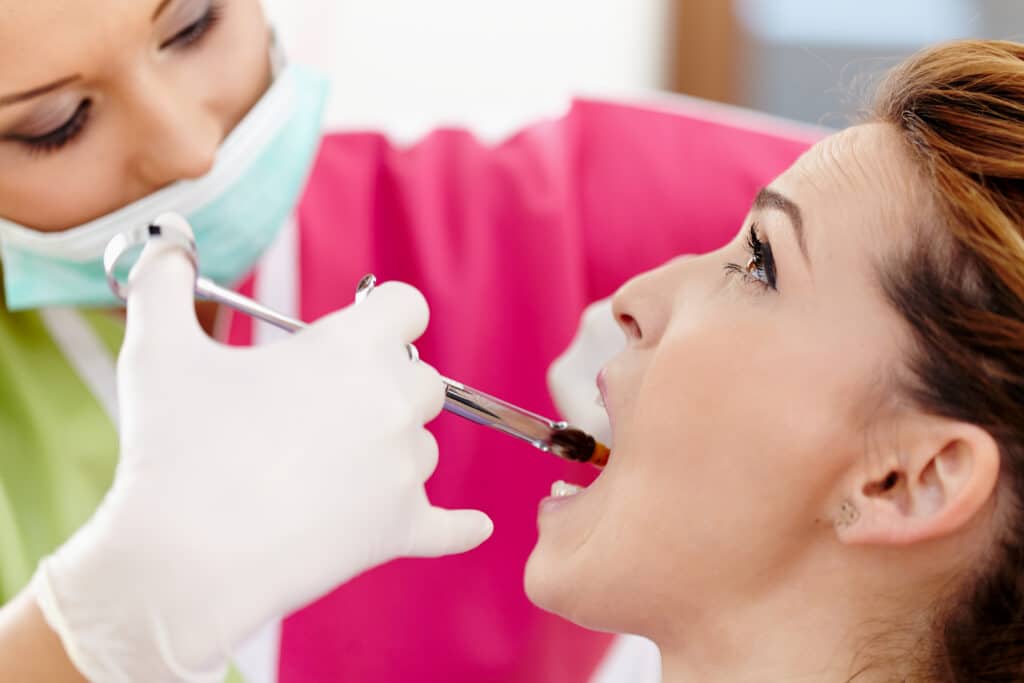Numbness after a dental procedure is a common experience that can last for several hours. This numbness can be uncomfortable and inconvenient, making it difficult for you to eat, drink, or speak. However, there are several ways to alleviate numbness after a dental procedure.
One way to get rid of numbness after a dental procedure is to massage the skin around your mouth. Rub your fingers in small circles around your gums and jaw to stimulate circulation. Another way is to keep moving. Taking a walk or performing light exercises can help increase circulation and reduce numbness faster. Additionally, massaging your face can also help alleviate numbness after a dental procedure.
Understanding Dental Numbness

Dental numbness is a common side effect of dental procedures that require the use of local anesthesia. This type of anesthesia is used to block pain signals from a specific area of the mouth or face during dental work. The most commonly used local anesthetic is Novocain, also known as Novocaine.
The numbness caused by local anesthesia can last for several hours after the dental procedure is complete. During this time, patients may experience difficulty speaking, eating, and drinking due to the lack of sensation in their mouth. While this can be uncomfortable, it is a normal part of the healing process and should subside on its own.
It is important to note that the length and severity of dental numbness can vary depending on the type of procedure performed and the amount of local anesthesia used. In some cases, patients may require multiple injections of local anesthesia to achieve complete numbness. However, excessive use of local anesthesia can cause complications such as nerve damage, so it is important to trust your dentist’s judgment when it comes to administering anesthetic.
If you are experiencing dental numbness after a procedure, there are several things you can do to help alleviate the discomfort. Massaging the face around the jaw can help with circulation and reduce numbness faster. Additionally, taking a walk or performing light exercises can also help to increase blood flow and reduce numbness.
It is important to be patient and allow the numbness to wear off naturally. Trying to eat or drink before the numbness has completely subsided can result in injury to the mouth or throat. If you are experiencing prolonged numbness or other unusual symptoms, it is important to contact your dentist immediately to rule out any potential complications.
Why Does Numbness Occur?
Numbness is a common side effect of dental procedures that involve the use of local anesthesia. Local anesthesia is a type of medication that is injected into the gums or applied topically to numb the area being treated. The medication blocks the nerves that transmit pain signals to the brain, which allows the dentist to perform the procedure without causing discomfort.
Numbness typically occurs after minor procedures such as fillings, as well as more complex procedures such as dental implants and root canals. The duration of numbness can vary depending on the type of procedure, the amount of anesthesia used, and the individual’s response to the medication.
In some cases, numbness after a dental procedure can indicate nerve damage or an abscess. If numbness persists for more than a few hours after a procedure, it is important to contact your dentist. They may need to perform additional tests to determine the cause of the numbness and provide appropriate treatment.
It is also important to note that numbness can occur after routine dental procedures such as cavity fillings and wisdom tooth extractions. While numbness is usually temporary and resolves on its own within a few hours, it is important to follow your dentist’s instructions for post-operative care to ensure a speedy recovery.
Overall, numbness after a dental procedure is a common side effect of local anesthesia. While it is usually temporary and resolves on its own, it is important to contact your dentist if numbness persists for more than a few hours or is accompanied by other symptoms.
How Long Does Numbness Last

Numbness after a dental procedure is a common side effect that can last for several hours. The duration of numbness depends on various factors such as the type of procedure, the location of the procedure, and the amount of anesthesia used. In most cases, the numbness wears off within 2-4 hours after the procedure. However, in some cases, the numbness may last for up to 8-10 hours.
If you are experiencing numbness after a dental procedure, it is important to wait it out and have patience. The sensation will gradually return as the anesthesia wears off. During this time, it is important to avoid eating or drinking anything until the numbness subsides to prevent accidentally biting your tongue or cheek.
If, after several hours, you are still experiencing numbness, it is recommended to contact your dentist and schedule a follow-up appointment. Lingering numbness after an oral procedure could indicate nerve damage or an abscess. A follow-up visit may be necessary to ensure that your recovery is progressing as expected.
In summary, numbness after a dental procedure is a common side effect that typically lasts for a few hours. It is important to wait it out and have patience as the anesthesia wears off. If numbness persists for an extended period, it is recommended to schedule a follow-up dental appointment to ensure proper recovery.
Effects of Numbness
Numbness is a common side effect of dental procedures that require the use of local anesthesia. It can affect various parts of the face, tongue, and lips, and may last for several hours after the procedure. While numbness is generally not harmful, it can be uncomfortable and may interfere with daily activities such as eating, drinking, and speaking.
One of the most significant effects of numbness is the risk of biting the tongue, cheek, or lips while eating or drinking. Patients should be careful when consuming hot or cold beverages and avoid chewing gum or hard foods until the numbness wears off.
Children may be more susceptible to the side effects of local anesthesia, including numbness. Parents should monitor their child closely after a dental procedure and ensure they do not accidentally injure themselves while they are still numb.
In some cases, numbness may be accompanied by other side effects such as vomiting or headaches. Patients who experience these symptoms should contact their dentist immediately.
Overall, while numbness is a common and generally harmless side effect of dental procedures, patients should take extra precautions to avoid accidental injury and monitor for any additional side effects.
Ways to Reduce Numbness

Numbness is a common side effect that occurs after a dental procedure. While it is usually temporary and harmless, it can be uncomfortable and make it difficult to eat or speak. Here are some ways to reduce numbness and help it wear off faster:
Massage the Jaw
Massaging the face around the jaw can help with circulation after getting an anesthetic. Before rubbing the jaw, a patient can use a warm compress to relieve numbness from dental work. Massaging the jaw can help stimulate blood flow and help the anesthetic wear off faster.
Physical Activity
Physical activity can help increase blood flow and circulation, which can help the anesthetic wear off faster. Patients can try going for a walk, doing light exercise, or stretching to help reduce numbness after dental work.
Salt Water
Rinsing your mouth with salt water can help reduce inflammation and promote healing, which can help reduce numbness after dental work. Mix a teaspoon of salt in a glass of warm water and swish it around your mouth for a few seconds before spitting it out.
Take a Nap
While taking a nap is the opposite of being active, falling asleep can help to get your mind off of the fact that certain areas of your mouth and face are numb. Sit back, relax, and allow the numbing sensation to pass until the sensation wears off peacefully.
Remember, numbness after dental work is normal and should go away in a few hours. If numbness persists for more than a few hours, contact your dentist.
Precautions to Take
After a dental procedure, it is common to experience numbness in the mouth. While this numbness is temporary, it can be uncomfortable and even inconvenient to deal with. Here are some precautions you can take to make the experience more manageable.
Rest and Sleep

One of the best ways to deal with numbness after a dental procedure is to rest and sleep. This will help your body recover and allow the numbness to wear off naturally. If you are feeling anxious or uncomfortable, try taking a nap to help you relax.
Avoid Anxiety
Anxiety can make the numbness feel worse, so it is important to avoid anything that might cause you stress or anxiety. Try to focus on calming activities such as deep breathing, meditation, or listening to music.
Distract Yourself
Distracting yourself can also be helpful when dealing with numbness. Try reading a book, completing a puzzle, or watching a movie to take your mind off the discomfort.
Home Remedies
There are also some home remedies that you can try to help alleviate the numbness. Drinking plenty of water can help flush out the anesthetic from your system more quickly. Applying a warm compress to the affected area can also help increase blood flow and promote healing.
Overall, it is important to take care of yourself after a dental procedure and be patient as the numbness wears off. By following these precautions, you can make the experience more comfortable and manageable.
When to Seek Medical Attention
In most cases, numbness after a dental procedure is temporary and will go away on its own. However, there are times when you should seek medical attention from your dentist or doctor.
If you are experiencing persistent numbness after five hours, it could be an indication of nerve damage or an abscess, and you should contact your dentist immediately. Lingering numbness could also be a sign of infection, which can lead to serious complications if left untreated.
Additionally, if you experience any of the following symptoms after a dental procedure, seek medical attention right away:
- Difficulty breathing or swallowing
- Swelling or bleeding that does not stop
- High fever or chills
- Severe pain or discomfort
- Unusual discharge or pus
It is also important to note that some people may have an allergic reaction to the anesthesia used during a dental procedure. If you experience any signs of an allergic reaction, such as difficulty breathing, hives, or swelling of the face or throat, seek immediate medical attention.
At Tompkins Dental, we recommend that our patients contact us if they experience any unusual symptoms after a dental procedure. Our team of experienced dentists can help diagnose and treat any issues that may arise.



